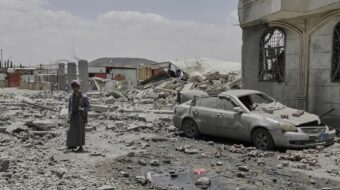Pyongyang announced on Thursday that it is preparing to fire a communication satellite into orbit, its clearest reference yet to an impending launch that the US has described as ‘provocative action.’
The DPRK Committee of Space Technology (CST) released a statement which read: ‘The preparations for launching experimental communications satellite Kwangmyongsong-2 by means of delivery rocket Unha-2 are now making brisk headway’ at a launch site in Hwadae in the north-east.
It did not say when the launch would take place, but analysts say that the launch may take place around the time of North Korea’s parliamentary elections on March 8.
A CST spokesman emphasised that, if this launch proves successful, ‘it will be possible to say that our country has made a stride in the development of space technologies and the building of an economic power.’
He added that North Korea is following its own ‘peaceful use policy’ in developing such technology.
South Korean intelligence officials reported a flurry of personnel and vehicle activity at the Hwadae launch site, but they said that the North has not yet placed a rocket on the launch pad.
After mounting the satellite or missile, it would take five to seven days to fuel the rocket.
Hwadae is also the launch site for North Korea’s longest-range missile, the Taepodong-2, with the potential to reach Alaska.
Pyongyang tested one of the missiles in 2006, but it failed 40 seconds after launch.
The US and South Korean media have repeatedly speculated in recent days that North Korea was going to test-fire a Taepodong-2 with a maximum estimated range of 4,200 miles and South Korea, Japan and the US have warned Pyongyang not to fire a missile.
Last week, US Secretary of State Hillary Clinton urged North Korea to stop its ‘provocative actions,’ saying that a missile test would ‘be very unhelpful.’
A UN security council resolution adopted after the North’s first-ever nuclear test in 2006 bans Pyongyang from conducting any future ballistic missile tests.
South Korea’s Foreign Ministry repeated warnings yesterday that a North Korean missile launch would violate that resolution, but Seoul University professor Yang Moo Jin pointed out that a satellite launch would not.









